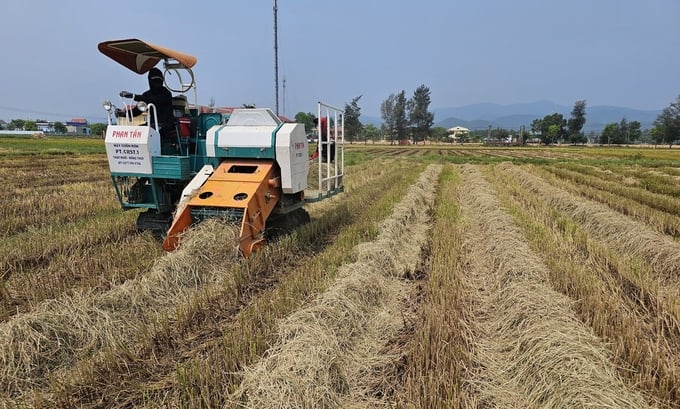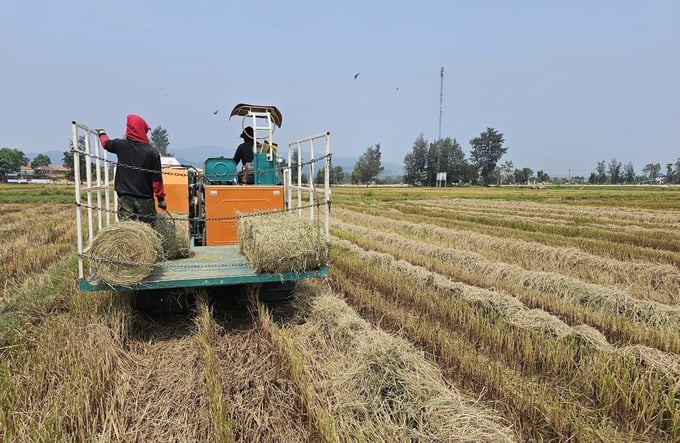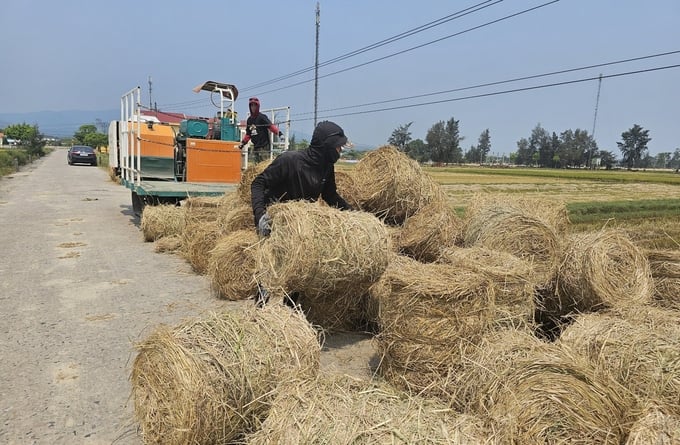May 20, 2025 | 16:16 GMT +7
May 20, 2025 | 16:16 GMT +7
Hotline: 0913.378.918
May 20, 2025 | 16:16 GMT +7
Hotline: 0913.378.918
Approaching noon, on the outskirts of Ham Ninh commune (Quang Ninh district, Quang Binh province), the sun was scorching, pouring down intense heat. In the recently harvested fields from the day before, one could still see the straw bundling machine diligently running back and forth. After a few rounds, the machine changed direction, climbing onto the village road, and then onto the inter-communal concrete road. On the concrete road, the machine moved vertically along the path, unloading dozens of straw bales onto the road with a rushing sound.

Straw bundling machine in operation in the fields of Ham Ninh commune. Photo: T.Phung.
Ms Nguyen Thi Kieu, a resident of Ham Ninh commune, walked over to count several dozen straw bales, jotting down the numbers in a ledger before turning to chat with us. She explained that after the rice was harvested, they waited until the next day for the straw to dry before harvesting it. "With the straw bundling machine, we can produce around 180 to 200 bales per ha, selling them to buyers for between VND 15,000 - VND 20,000 per bale depending on the quality of the wet or dry straw. On average, we earn over VND 3 million per ha from selling straws", said Ms Kieu.
Ms Kieu also mentioned that the main buyers of straw are traders from northern provinces who place orders according to their needs. They say they use the straw for livestock feed and mushroom cultivation. "Many gardeners also buy large quantities to mulch the base of trees to prevent drought, and later the decomposed straw becomes fertilizer for the trees. In general, there is not enough straw to meet the demand of buyers. Straw is in high demand and perhaps commands a high price due to the hot weather making the straw dry, which is preferred by buyers", added Ms Kieu.

The straw is tightly bundled and stacked behind the hauling trailer. Photo: T. Phung.
I followed the bundling machine out to the field. Because the machine moves on rubber tracks, it can navigate even in muddy fields. As the machine operates, Mr Nguyen Quang Phon controls the straw bundling blade, which cuts close to the ground. The straw is then rolled onto a spindle, tightly bundled, and wrapped with barbed wire. After each bundle is completed, it is pushed out the back of the hauling trailer. Mr Nguyen Tay, assisting at the rear, stacks the bundled straws on top of each other. When the trailer is full, Mr Tay signals Mr Phon to drive back to the main road to unload the bundled straw for storage. Once the straw is ready for transport, Ms Kieu calls for a large truck to come and load it for transportation.
Mr Phon and Mr Tay are brothers from Soc Trang province. Mr Phon mentioned that they also work in this profession in their hometown. When the season there ends, they travel to other provinces for work. Mr Phon explained, "I work as a labourer for the machine owner. I earn about three and a half thousand dong for each bundle of straw. On average, my brother and I have a monthly income of around 10 million dong after deducting living expenses. The straw season in Quang Binh lasts about 3 months. After that, we move on to other harvesting locations."
Ms Kieu, the machine owner, explained that after the rice harvest season, local farmers often burn the straw, which is not only wasteful but also environmentally harmful. In fact, there have been tragic accidents caused by dense smoke from burning straws in the fields, which confused drivers and led to accidents. Seeing the demand for straw, Ms. Kieu invested in buying a modern rubber-tracked straw bundling machine to collect the straw. Ms Kieu calculated, "If it were our family's fields, we could earn an additional VND 3 million per ha from selling straw. If it's other people's fields, we have to pay for machine operation and buy straws from them, but we still make a profit of about VND 7 - 10 thousand per bundle."
Ms Kieu also mentioned that during the harvest season, the selling price of straw is higher. When the harvest is good, buyers also consider the straw's quality. If stored properly, it can be kept for a long time or used for mushroom cultivation with high productivity and low disease incidence. "With a good harvest like this year, farmers and straw harvesters alike have abundant profits", Ms Kieu said excitedly.

Rice straw bales are "loaded" along the main roadside for transportation to collection points. Photo: T.Phung.
According to Mr Tran Dinh Hiep, Deputy Director of the Department of Agriculture and Rural Development of Quang Binh Province, using modern straw bundling machines to harvest straw after rice harvesting is a very good solution for agricultural production. "This has solved the problem of increasing income for farmers and reduced the burning of straw in the fields. At the same time, it provides fertilizer for orchards, supports livestock farming, and other suitable industries", Mr Hiep shared.
Translated by Hoang Duy

(VAN) In 2024, over 295 million people across 53 countries and territories faced acute hunger—an increase of almost 14 million people compared to 2023, while the number of people facing catastrophic levels of hunger reached a record high.

(VAN) World Environment Day 2025 (June 5) carries the theme 'Beat Plastic Pollution' continuing to emphasize the global urgency of addressing the plastic waste crisis.

(VAN) This was the assessment shared by experts at the workshop titled 'Assessing the Role and Potential of Low-Emission Rice Production Systems in Vietnam,' held on the morning of May 19.

(VAN) Cai Rong Port is the fisheries control center of Quang Ninh, helping to monitor fishing vessels, combat IUU fishing, and remove the EC's 'yellow card'.

(VAN) The German Agricultural Society (DLG) explores the possibility of establishing a mechanization service center in Vietnam’s Mekong Delta to support farmers in accessing and utilizing advanced machinery.

(VAN) On May 16, the Department of Water Resources Management, in collaboration with the Food and Agriculture Organization of the United Nations (FAO), held a signing ceremony for the GEF-8 project document.

(VAN) Food safety, mechanization, vocational training, and market opening are key areas of cooperation expected between the Vietnamese Government and the Federal Republic of Germany.